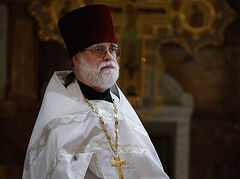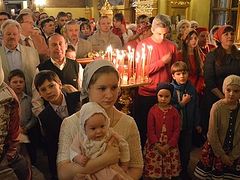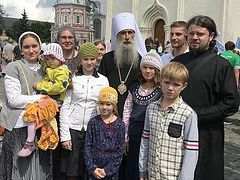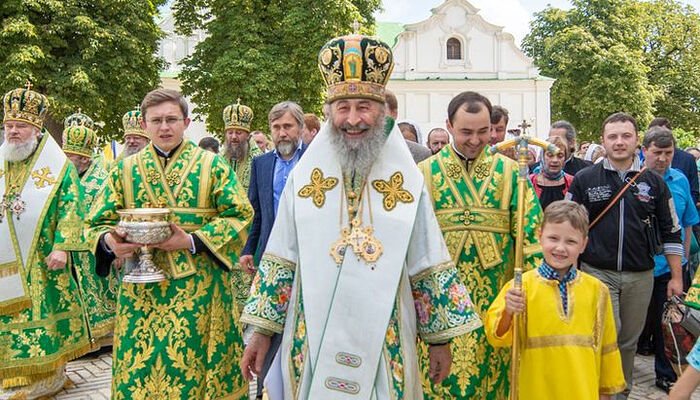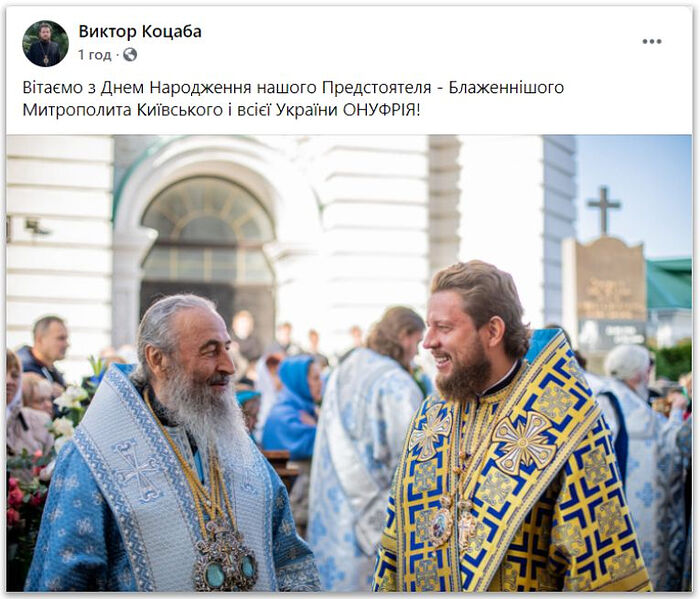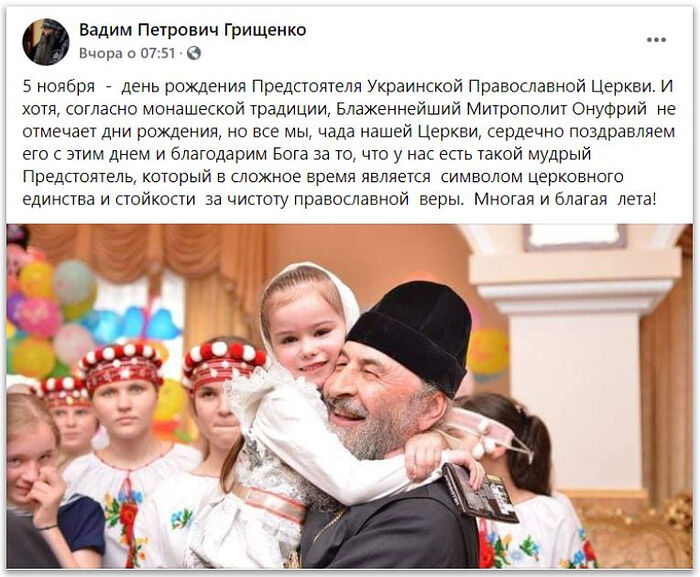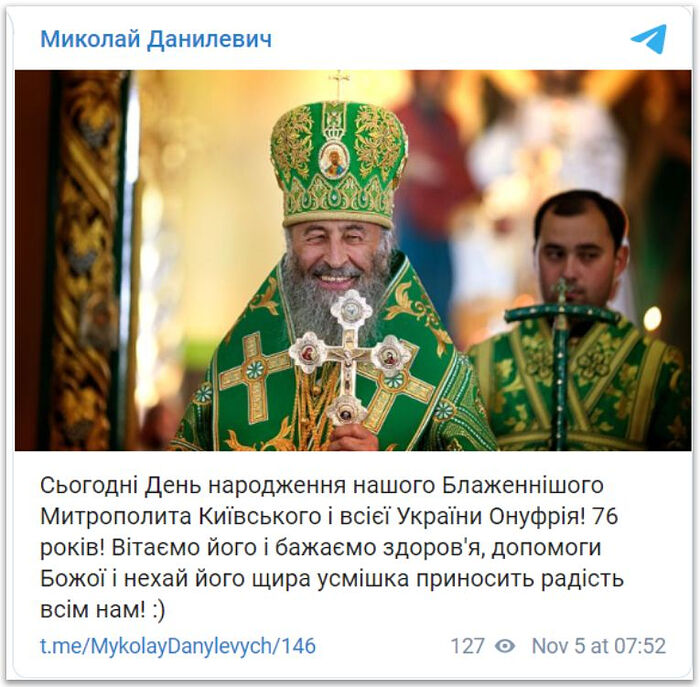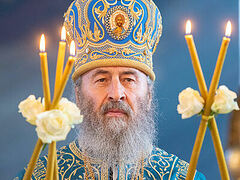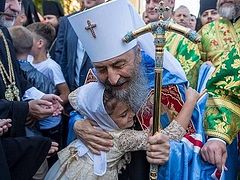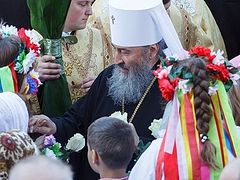“GERMANS VIEW THE ORTHODOX CHURCH AS THE KEEPER OF PATRISTIC TRADITIONS”
A talk with Priest Alexey Veselov
Priest Alexey (Alexey) Veselov, head priest of the Russian Orthodox Church of the Great-Martyr Barbara in the town of Krefeld (North Rhine–Westphalia) in Germany, converted to the faith while at an Orthodox youth camp. Today he organizes Orthodox groups for children and adults from all over Germany. In his interview with Pravoslavie.ru, Fr. Alexey, head of the Department for Youth Ministry of the Diocese of Berlin and Germany (Moscow Patriarchate), talked about bringing up children, the experience of family life, parish life, and the bright sides of the pandemic.
“The priesthood is a contribution to eternity”
—Fr. Alexey, how did you end up in Germany? Were you born here or did you move from Russia?
—I was born in St. Petersburg. When I was five, we moved to Riga, and when I turned eleven, we moved to Germany. My mother and grandma began to go to church in Riga and took me to the Church of All Saints there. I even helped in the altar on two occasions. I remember us taking the tram to the Holy Trinity—St. Sergius women’s monastery from time to time. The prayerful atmosphere in the convent’s little wooden church left a deep impression on me.
—In your video on the Orthodox youth camp in Krefeld you mentioned that you yourself converted to Orthodoxy after spending time among religious children at camp many years ago. How did that happen? Were those events decisive in your choice to become a priest?
—Soon after moving to Germany I forgot about the Church and God. It wasn’t so much about moving as it was about reaching puberty. Once, when I was about sixteen, my mom decided to take me to an Orthodox summer camp in Crimea. The prospect of being in a “cult” for three weeks terrified me. My mother tried to cheer me up by saying that the kids there would be my age, but I was sure all of them would be fanatics. I had an image in my mind: a group of teenagers, walking down the street with open Bibles in their hands, reading as they walked. At that time I wanted to become a programmer and I decided that I would spend the entire three weeks in my room learning the C++ programming language. To my great surprise, I met normal teenagers in the camp. But not only did I make many new friends in Crimea, I found God there! Within a few weeks I changed my mind and decided to become a priest and not a programmer. It was my youthful maximalism:—I thought that any other work bears only temporary fruit, that any computer program would soon become outdated and even any house you build will sooner or later fall apart. But the priesthood is a contribution to eternity. Even if one human soul is saved with my help, the fruit is eternal.
“Orthodox summer camp is the most effective form of youth work”
—Is it only children from Germany that attend childrens and youth summer camps that you organize or do some come from other countries too?
—Most children come from Germany, but there are also guests from abroad.
— Can you tell us more about the idea, the way the camps work and other distinctive features worth mentioning?
— The Russian diaspora conceived the idea long ago, and in our diocese it began to spread in the 1990s after a wave of mass emigration and the repatriation [of many Russians of German descent—Trans.]. In my opinion, camp is the most effective form of youth work. At camp, adults, youth and children live together in a Christian community for a week. We have a common daily routine: we cook, eat and study together. Someone who goes to the Orthodox camp is plunged into an Orthodox environment for the whole week.
If a child has only one or two churched classmates at school, then in such camps all people around are Orthodox. So the child feels at home there, seeing that there are many Orthodox around him. This week transforms children—they feel the kindness of Orthodox people and their difference from other people in the world. I often receive calls from astonished parents who say that after camp their children’s attitudes towards their families and their faith have changed.
—I can’t refrain from asking about the people who put in the effort to organize such camps. These people are priests, teachers, churchwardens, concerned parents and some active youth? Please tell us about them.
—These are mostly parents who are not indifferent to their children’s spiritual life. Everybody at the camp is a volunteer. Most of them are working people who come to the camp as part of their vacation. For example, there are doctors who work full time and attend the camp on vacation as cooks and stand at the stove ten hours a day all week. If we have about 100 children in a group, we need twenty adults (coordinators, teachers, cooks) and the same number of teenage counselors to manage this group. And, surprisingly, there are always those who are willing to help!
As I’ve said, there are also counselors in the camp. As a rule, these are young people who have “grown up at camp,” that is, who began to go to camp as children some years ago. Ninety percent of the children in each new group are those who previously attended our camp. So almost all of them know each other and we have a family, friendly and trusting atmosphere. That is a very important element in our concept. The concept of our camp is that a seven-year old child comes for the first time, then for several years he comes to camp twice a year; at fifteen he becomes a counselor and helps in this role at camp for the next few years. More than that, I observe how years later, when they have their own families, the same people become volunteers and coordinators in the camp.
—What is the main conclusion you have made over these years of work with youth and children?
—We must work with them! Day after day, at school, university, online and in society, people influence our youth, offer them their views and values. If we don’t offer them an alternative outlook, how will they choose the Church? You can only choose something that you know. This isn’t clear to the older generation because they came to the Church in a totally different environment. Indeed, twenty or thirty years ago young people would begin to integrate into Church life without any youth work. But this was the period after the collapse of the USSR, of searching for one’s identity, spirituality or simply a better life. Modern young people grow up in comfort and the world dictates its values to them. They require active outreach.
“Faces of the Parish”
—Let’s talk a little about your parish. Where is it situated? What saint is it dedicated to? Is it large? Are your parishioners emigrants from Russia, or from other post-Soviet states, or descendants of earlier emigrants? Are there local German converts among your parishioners?
—Our parish is dedicated to the Great-Martyr Barbara. St. Barbara, the patroness of miners, protects from unexpected and sudden death. North Rhine-Westphalia, the region our town is located in, was once famous for coal mining. Images of St. Barbara could be found at the entrances of all the mines. Miners would pray for her protection before their descent so that they would return alive that day. That’s why we chose St. Barbara, who is particularly venerated here.
The majority of our parishioners are Russian Germans. But there are also emigrants from Russia, Ukraine, Moldova and elsewhere. We also have quite a few German converts as interest in Orthodoxy among locals keeps increasing.
—Why are they so interested in our faith?
—Germans view the Orthodox Church as the keeper of Patristic traditions. That’s not an exaggeration. They see that, contrary to local Catholics and Protestants, we strive to live piously and take the Bible seriously. We keep fasts, pray and don’t let ourselves be led by modern values. In the Western denominations today, everything is blurry—there is no substance.
It isn’t easy for Germans to become Orthodox, both emotionally and in practice. They have to not only abandon the faith of their fathers but also to become members of a foreign community with a different mentality and an unfamiliar language. However, the desire to find the truth is so strong that more and more Germans are deciding to take on this burden.
—How did it occur to you to launch the “Faces of the Parish” project? What kind of project is it? What other initiatives do you and your parishioners organize aside from services?
—The project started by chance. We were going to make a film about our parish and wanted to choose a concept. During our search we wondered, “What is a parish?” And we understood that a parish is the people, the parishioners. Not events, not Sunday school, not the priest—it is the faithful who go to church. Then we decided to show their faces in the film and recorded interviews with some parishioners. But the recordings turned out to be so good and so profound that we chose to publish each interview separately to give an opportunity both to our parishioners and those interested in our community to get acquainted with people who attend our church.
“This school helps keep families together”
—With your rich experience, can you tell us how parents should bring up their children correctly nowadays?
—Oh, that’s a very big and complex question. I don’t know how to answer it in a few words. They should do it consciously.
Parents nowadays are supposed to know a lot and develop all the time. They need to read literature about childrearing and analyze themselves impartially. They should learn to build relationships with their children. They should study their faith thoroughly in order to be able to give serious answers to their kids.
—Please, tell us about the family school in your parish?
—The idea for such a school came from a real need. Many couples face two difficulties: how to bring up children and how to live as husband and wife. Unable to look at their own relationships and those with their children from the outside, they get stuck in a vicious circle of problems. The logic is as follows: five years in a row I have been telling my son not to leave his dirty socks on the floor. Perhaps I should tell him one more time—then he will hear me and understand at last. But then, his dirty socks are not with the dirty laundry yet again, which irritates me. Husband and wife often misunderstand each other in the same way.
 During the Maslenitsa (Cheese-fare) Week
During the Maslenitsa (Cheese-fare) Week
Such issues are natural because nobody taught us how to be spouses or parents. The only example to use as a guide is that of our own parents. But this example isn’t always ideal or appropriate in our own life. That’s why working with couples has become an important part of our parish life. Once a month we gather at our school for families and parents, discuss issues, try to look at them from the outside, reassess married life and parenthood. We read books together and discuss them.
Most couples say that after these talks their married life improves. In some cases, this school has helped keep families together.
“In Germany no one even knows the expression ‘child protection services’”
—Legal conflicts related to child protection services, which came from Europe, is a bogey that we are terrified of in Russia.1 That is understandable—images of children being taken away from families (including large families) for no apparent reasons seems horrifying and unnaturally savage. Where is the truth and where are the lies in these stories?
—In Germany no one even knows the expression “child protection services”. In Germany, there is the Jugendamt (the “Youth Office”) that theoretically has the right to remove children from families. It is done only in extreme cases and when there are good reasons. Since I am responsible for youth work, I have a wide social circle in Germany. For instance, in the last group at camp, I had children from fifty-three cities and towns of Germany. Over the years of my practice I haven’t seen a single instance when children were unfairly taken out of families. I asked dozens of fellow priests in this country and none of them could think of any case of children being taken for no reason.
I personally can recall only a few cases. In one of them, a single mother who was raising her child developed a severe mental illness. It was a tragedy, and she was truly unable to take care of her child, let alone raise him. In another case, a father quarreled with a teenage boy, both ran out into the street, and the child screamed at his father while hysterically waving a knife. The police took the teenager to a children’s home but two weeks later they returned him to his family. And the other day I heard another story: a child was coming to school with bruises for several years in a row. He told the teachers that his father beat him with a belt. One day, when the boy again came to class with black eyes, he was taken away from his family. But even in that instance he was returned to his parents after a time.
Meanwhile, I can tell you many stories when the Jugendamt helped parents in difficult situations. Germans believe that parents are the best educators. So when the Jugendamt learns that there are problems in a family, it does its best to help and support the parents. The removal of a child is a drastic and rare measure. Even if a child is separated from his parents, he will surely be returned to them once they have solved the problems that led to the removal. True, any system can fail; perhaps contrary examples exist, but these are rare exceptions.
The fact that scary stories about child protection services are spread even by the Russian Church media upsets me. There are even a number of video interviews with “victims” of child protection services in Germany. As I listen to them, I feel as though these people lived in a different country than me. Maybe there are isolated cases of discrimination against Russians in Germany or of mistreatment of Russian children in German schools, but these are certainly not the norm.
In another interview, a woman recounted how the Jugendamt was harassing her, trying to take her child away and turning her oldest daughter against her. After that, I spoke to two priests who knew that woman. And it turned out that the woman was mentally unbalanced, she tyrannized and traumatized her children. Her oldest daughter had run away from home because it had been unbearable to live with her mother, not because someone had turned her against her mother. But in that interview, the woman was portrayed as a victim; she said foolish things about German schools, etc. And listeners believe her. They make the conclusion that Russians are hated in Germany and Russian families are destroyed. That is very regrettable.
“Parishioners understand that this is their church and their community”
 —What is special about parish life in Germany?
—What is special about parish life in Germany?
—As a rule, parishes are small but tight-knit. All the parishioners know, help and support one another. Last Pascha we had about 200 communicants, and I knew almost all of them by name. A priest has very close relations with his parishioners; anyone can phone me, talk to me, ask me something. Having such close ties with people means a lot.
Another quality is the activity of our parishioners. Our communities don’t have enough funds for staff, so all the necessary work is done by parishioners on a voluntary basis: cleaning, cooking, repairs, singing and reading in church, and teaching in Sunday school. They understand that it is their church, their community.
When our parish grew very large, we felt the need to regulate the volunteer work of our parishioners and we created working groups. Each group is headed by a coordinator who discusses any questions that come up with me and manages the group. Now we have twenty-four such groups. Last year, Bishop Panteleimon (Shatov) came to Germany for Orthodox Volunteer Day. Walking past the board with the photographs, names and positions of our coordinators, he lingered and took pictures of them several times—he was so impressed by the initiative.
Sometimes people ask me, “Fr. Alexey, you have such an active parish and do so many things in it. How do you manage this work?” There is no secret here. I simply don’t interfere in people’s work. Someone can come up to me and ask, “Fr. Alexey, may I do such-and-such?” I answer, “Please do! May God bless you.” Of course, I encourage, support and guide people, discuss projects with them. But in the church, we have many laypeople who want to help and do something, and that’s a huge resource.
The Catholic Church in Germany has enormous financial resources, they have the Church tax. The Orthodox Church isn’t part of this system2 and we aren’t financed from Moscow, so not all parishes can afford salaries for their priests. Despite this, parish life in most of our communities is more active than that of Catholics. For this we are indebted to our volunteers in our parishes who understand that these are their churches, that everything they do in them they do for themselves, their children and neighbors.
—What problems do you face in your interaction with the government? How are your relations with representatives of other denominations, first and foremost with the Lutherans? What about other Local Orthodox Churches?
—Generally, government bodies in Germany respect and trust religious communities. The Orthodox Church enjoys this privilege too. But, to be honest, in most cases Orthodox communities have hardly any relations with city administrations or other denominations. Of course, there are no negative attitudes—we simply have no spheres of interaction. We live on our own: celebrate services, organize our parish life, etc.
Catholics, and sometimes Protestants, lease out their premises to us. In some cases, they even sell their churches—our parish, for example, bought a church building previously owned by Catholics. At times we celebrate in Catholic churches in front of relics of local pre-schism saints (but with no participation by non-Orthodox clergy).
As for other Local Orthodox Churches, we show respect for each other, but we don’t really share any common interests. All of us are chiefly concerned with our flocks.
“We shouldn’t forget that our main objective is the Lord”
—How has the pandemic affected your parish life, your activities outside of divine services, your personal life and plans? Are the restrictions already over or are they still part of your lives? How do you personally view this complex and ambiguous situation?
—In the book, The Seven Habits of Highly Effective People, by Stephen Covey, the fourth habit is formulated as, “think win–win.” One can think “win–lose”: If there’s no COVID-19, that’s good, but if there is COVID-19, then that’s bad. According to Covey, that is incorrect. It’s true that many people are now experiencing financial difficulties. I have set a goal for myself personally and for my parishioners: to make as much as possible out of the situation. Now that I have more free time, and I’ve started writing articles about child-rearing, recording educational videos in German. I have finished some projects that I hadn’t been able to complete for lack of time for several years. And I have done some repairs at home.
Parish life in our church, apart from services which we celebrate on a regular basis, has all but stopped. But now we have more services, so we can devote more time to prayer. There are fewer people at services which are now held without haste, and I can dedicate more time to confession. I also try to communicate more with our parishioners outside service times.
 A pilgrimage to St. Lubentius of Dietkirchen
A pilgrimage to St. Lubentius of Dietkirchen
—Fr. Alexey, if Orthodox pilgrims come to Germany, what places should they definitely visit and why?
—There are countless relics and holy sites in Germany venerated both by the Eastern and the Western Christians. The difficulty is that it is not always easy to locate the shrines because the veneration of saints and even their relics has declined among Catholics. If you visit the websites of German Catholic churches, you will find when and in what architectural styles they were built, the information on the tonal qualities of their bells, their groups and other activities, but you will hardly find anything about the relics kept in these churches. So, if you plan to visit Germany, I’d recommend contacting a local Orthodox community and inquire about the relics in a particular city or town. I am working on a map of Orthodox shrines of Germany, but unfortunately, not too many places are marked on it.
—And now, the traditional question we ask all our guests: What quote from the Holy Scriptures inspires you most and consoles you in hard times?
—The words of the main commandment: Thou shalt love the Lord thy God with all thy heart, and with all thy soul, and with all thy mind (Mt. 22:37). Whatever we do in the Church and in our lives, we shouldn’t forget that our main objective is the Lord.
10/28/2020
1 This is also a running fear for Americans, since reports have been seen on various Christian websites about German Christian families who have been threatened for homeschooling their children instead of taking them to public schools. Certain U.S. states also have stricter child protection laws than others. Another fear for Russians concerning child protection services is the potential for corruption on the part of the officials. If money can be made in the adoption industry, the power to remove healthy children from families could be abused. This interview merely shows another side to the situation in Germany, and its publication here is not intended to reflect OrthoChristian’s view on child protection services.—OC.
2 There are only a few recognized faiths on German tax returns. German citizens must check one of them, and a percentage goes to that faith. One of the options is “atheist”.








